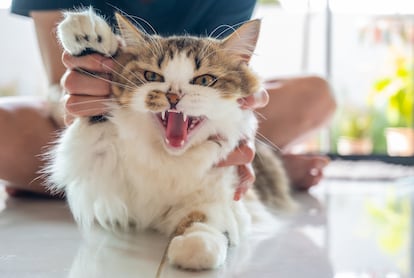Nine mistakes that can harm your cat’s health: Normalizing vomiting or confusing coughs with hairballs
Felines are famously low-maintenance, but that does not mean that anything goes. Here’s what you should (and shouldn’t) do to ensure their happiness and well-being

When cat owners do not understand the nature and the needs of their pets, they can make mistakes that may affect their well-being and health. “They can develop chronic stress, anxiety, cystitis, obesity, aggression or behavioral problems, such as inappropriate use of the litter box,” explains Susana García, accredited veterinarian from the Association of Spanish Veterinarians Specializing in Small Animals (AVEPA) and scientific director of VerPartners.
Felines are predators, and one of the classic mistakes that people make has to do with the space where they live. “A cat needs an environment where it can develop its hunting nature, with hiding spots or elevated places to control its territory. It is advisable to give them access to these kinds of resources, such as high shelves on the wall for them to climb onto, or cat trees,” García recommends. The specialist highlights the routine nature of cats, and how much they dislike unforeseen changes: “Frequent novelties in the house stress them out. Predictability makes them feel calm and comfortable, so they dislike situations such as riding in cars, relocating or staying in houses of people they don’t know.” When several cats live together, the house must be adapted to that specific circumstance. “Each one must have their own separate resources, as is the case of water and food dishes, litter boxes or resting places.” The veterinarian also emphasizes that we must avoid “toxic plants, such as oleanders or lilies, as well as scolding them, hitting them or feeding them low-quality food.”
Nine mistakes to avoid
The mistakes that cat owners usually make with felines and that put their well-being at risk have to do with issues ranging from food or play to hydration. Tania Velasco, director of the Neko Feline Clinic and member of the scientific committee of the Feline Medicine Specialty Group (GEMFE), lists the nine most common:
- An inadequate diet that does not cover their nutritional needs — such as vegetarian food (they are strict carnivores) or giving them dog food — can cause health problems like retinal atrophy or cardiomyopathy. Certain foods can cause digestive problems or poisoning, such as chocolate, garlic, onion, avocado or broccoli.
- Lack of proper hydration. These animals come from desert environments, so they have a great capacity to concentrate their urine, which makes them prone to dehydration. They need to have fresh water always available, and cans of special wet food. This type of diet is less fattening than dry food, so it prevents obesity in cats, which can cause diseases such as feline diabetes.
- Normalizing and favoring a sedentary lifestyle. Cats need physical activity to stimulate their hunting instinct and to avoid behavioral problems and stress. It is a good idea to have accessories for playing (fishing rod-style toys with feathers, for example), scratching posts and elevated rest areas (platforms or cat trees).

- Seeing vomiting as normal. Vomiting may indicate food intolerances, digestive tumors or intestinal inflammation, so it is advisable to see a specialist. You should not attribute all gastrointestinal symptoms to hairballs; a healthy short-haired cat should not vomit frequently.
- Avoid rough play, such as playfully batting them with your hands, to prevent aggressive behavior and injuries. This practice stimulates the cat’s belief that hands or feet are prey, so it is better to use special toys.
- Ignoring the importance of vaccinations and deworming for cats that never go out. Even if it cannot go outside, it can contract internal parasites that also affect people, which is why it is recommended to carry out these veterinary treatments.
- Not taking the cat to the vet because it becomes stressed. This is dangerous for the animal’s health, because it causes delays in diagnoses. There are ways to minimize this nervousness, such as the use of relaxing pheromones.
- Neglecting weight control. Quickly detecting the loss or gain of pounds is essential if those changes are being caused by a disease, so it is advisable to weigh the cat regularly and keep track of any changes.
- Confusing coughing with hairballs. In reality, it may be bronchitis or heart problems that should be treated as soon as possible.
Sign up for our weekly newsletter to get more English-language news coverage from EL PAÍS USA Edition
Tu suscripción se está usando en otro dispositivo
¿Quieres añadir otro usuario a tu suscripción?
Si continúas leyendo en este dispositivo, no se podrá leer en el otro.
FlechaTu suscripción se está usando en otro dispositivo y solo puedes acceder a EL PAÍS desde un dispositivo a la vez.
Si quieres compartir tu cuenta, cambia tu suscripción a la modalidad Premium, así podrás añadir otro usuario. Cada uno accederá con su propia cuenta de email, lo que os permitirá personalizar vuestra experiencia en EL PAÍS.
¿Tienes una suscripción de empresa? Accede aquí para contratar más cuentas.
En el caso de no saber quién está usando tu cuenta, te recomendamos cambiar tu contraseña aquí.
Si decides continuar compartiendo tu cuenta, este mensaje se mostrará en tu dispositivo y en el de la otra persona que está usando tu cuenta de forma indefinida, afectando a tu experiencia de lectura. Puedes consultar aquí los términos y condiciones de la suscripción digital.









































